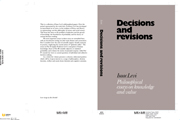Book contents
- Frontmatter
- Contents
- Preface
- PART I Cognitive decision making
- 1 Must the scientist make value judgements?
- 2 On the seriousness of mistakes
- 3 Corroboration and rules of acceptance
- 4 Deductive cogency in inductive inference
- 5 Information and inference
- 6 Epistemic utility and the evaluation of experiments
- 7 Abduction and demands for information
- PART II Knowledge and ignorance
- PART III Chance and surprise
- PART IV Decision making
- Bibliography of Isaac Levi
- Bibliography
- Index of names
- Index of subjects
6 - Epistemic utility and the evaluation of experiments
Published online by Cambridge University Press: 26 March 2010
- Frontmatter
- Contents
- Preface
- PART I Cognitive decision making
- 1 Must the scientist make value judgements?
- 2 On the seriousness of mistakes
- 3 Corroboration and rules of acceptance
- 4 Deductive cogency in inductive inference
- 5 Information and inference
- 6 Epistemic utility and the evaluation of experiments
- 7 Abduction and demands for information
- PART II Knowledge and ignorance
- PART III Chance and surprise
- PART IV Decision making
- Bibliography of Isaac Levi
- Bibliography
- Index of names
- Index of subjects
Summary
In a thoughtful and penetrating paper (1976), William K. Goosens undertakes to show that the account of epistemic utilities and criteria for inductive acceptance I proposed in (1967a) as modified in (1967c) runs into serious difficulties when applied to the problem of designing experiments – in particular, when alternative experiments are being evaluated prior to choosing one for implementation.
My previously published remarks on this topic (1967a, ch. IX) were at best fragmentary and not focused on the specific questions Goosens considers. Goosens, therefore, undertakes an examination of the ramifications (if any) of my account of epistemic utility and inductive acceptance for the evaluation of rival experiments. Goosens doubts, in point of fact, that such ramifications can be identified without supplementing my proposals with additional constraints. He does, however, consider one such constraint which, he demonstrates, leads to what he claims to be unacceptable consequences. He acknowledges that I might have good reason for refusing to accept that constraint. However, he then claims that there are too many possible alternatives to contemplate, none of which recommends itself to us.
In this paper, I shall first pose Goosens' problem and identify some assumptions concerning how it ought to be solved which he endorses and which I, for the sake of this argument, shall not question. I shall then review the main features of my account of epistemic utilities relevant to the solution and derive the solution required by combining my theory with the assumptions we share in common.
Information
- Type
- Chapter
- Information
- Decisions and RevisionsPhilosophical Essays on Knowledge and Value, pp. 70 - 86Publisher: Cambridge University PressPrint publication year: 1984
